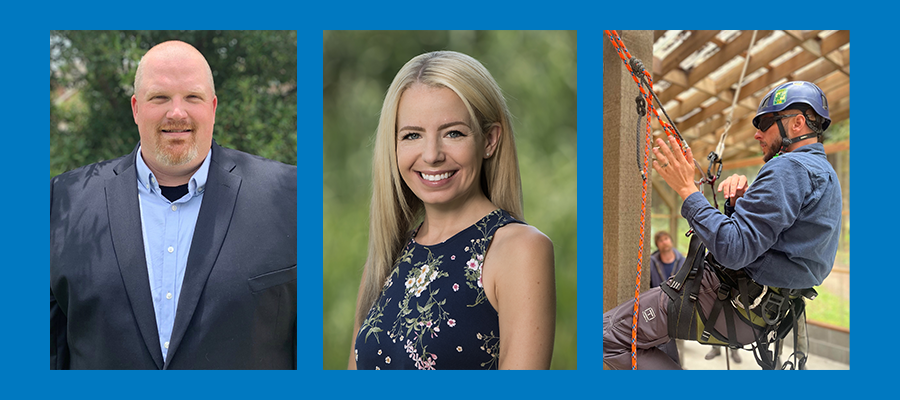- Vegetation Management Services
- Industries
- In Your Neighborhood
- About
- Careers
- Webinars
- Articles
Be PROACTIVE About Tribal Outreach

Be PROACTIVE About Tribal Outreach
By M.K. Youngblood, safety manager and tribal liaison, ACRT Pacific
Why is tribal outreach important while working in vegetation management? It fosters Tribal sovereignty, social responsibility and reputation, cultural sensitivity, collaboration, engagement, compliance with federal guidelines, and more.
Overall, outreach to Tribes is important for businesses working in vegetation management to establish respectful and collaborative relationships with Native American Tribes, leading to more effective and sustainable vegetation management practices that align with Tribal values and promote mutual benefits.
Tailoring outreach efforts to tribes is crucial for vegetation management companies to effectively engage in collaborative decision-making with Native American tribes. Here are some ways our industry can tailor outreach efforts to tribes by being PROACTIVE.
P – Provide Opportunities for Tribal Employment
Providing opportunities for tribal employment, particularly through collaboration with Tribal Employment Rights Offices (TERO), represents a cornerstone in fostering meaningful tribal engagement and outreach. TEROs serve as vital intermediaries, ensuring that tribal members gain access to employment opportunities that are both meaningful and sustainable within their own communities. This initiative transcends mere job creation; it becomes a catalyst for holistic community development.
Providing opportunities for tribal employment through TERO not only drives economic growth but also nurtures a symbiotic relationship between businesses and tribes. It fosters a sense of belonging, pride, and empowerment among tribal members, reinforcing the cultural fabric of indigenous communities. This collaborative effort, grounded in respect and reciprocity, stands as a testament to the transformative power of meaningful employment in fostering genuine tribal engagement and outreach.
R – Research Tribal Localities and Ancestral Homelands
Thorough research is the bedrock upon which effective tribal engagement is built. Businesses aspiring for genuine collaboration must invest time and effort to comprehend the intricate details of the tribes they aim to work with. One crucial aspect of this research involves determining whether the tribe is local or regional — understanding the geographical scope of their influence. Equally important is identifying the precise locations of their traditional ancestral homelands.
The investment in thorough research is not just an initial step but an ongoing commitment. It is the bridge that connects businesses with tribal communities on a deeper, more meaningful level. By demonstrating respect for tribal history and culture through this research, businesses pave the way for authentic partnerships, where the exchange is not just transactional but enriching for all parties involved.
O – Opportunity for Future Projects with the Tribe
Collaboration that transcends the boundaries of immediate projects is fundamental for building enduring relationships between businesses and tribal communities. Engaging in discussions and strategic planning for future endeavors showcases a business’s dedication to long-term engagement. This forward-thinking approach transforms the nature of the relationship, positioning businesses as genuine partners in the progress and development of tribal communities.
By involving tribes in discussions about future projects, businesses send a powerful message: they are not merely interested in short-term gains but are invested in the sustained well-being and growth of the tribal community. Long-term engagement paves the way for innovative solutions to emerge. As businesses and tribes work together over an extended period, they develop a shared vision for the future. This collaborative vision often leads to creative and sustainable projects that have a lasting impact on the community, fostering self-reliance and resilience among tribal members.
A – Advocate for Tribal Collaboration
Advocacy stands as a powerful catalyst in the realm of tribal engagement, shaping attitudes, policies, and perceptions within industries and communities. Businesses, therefore, bear a significant responsibility to actively promote the importance of tribal collaboration. By becoming advocates for respectful and meaningful engagement with tribes, these businesses initiate a transformative process that extends far beyond their immediate projects.
Remember, advocacy is not just a one-time effort; it is an ongoing commitment to promoting the values of respect, understanding, and collaboration. Businesses that advocate for tribal engagement contribute significantly to the creation of a more inclusive society where tribal communities are recognized, appreciated, and integrated into the social and economic fabric. Through their advocacy, these businesses play a pivotal role in fostering a future where partnerships between tribes and industries are not just common but are characterized by mutual respect, understanding, and shared prosperity.
C – Consult Early and Often
Frequent and early consultations, which may also be required by law, are the cornerstones of successful collaboration between businesses and tribal communities. Establishing a continuous line of communication from the outset is vital for building trust, preventing misunderstandings, and fostering a relationship built on mutual respect and understanding.
Developing projects that are culturally sensitive and mutually beneficial requires a collaborative mindset. Businesses must be willing to adapt their strategies based on the feedback and suggestions provided by tribal communities. By embracing a flexible and inclusive approach, businesses can create initiatives that align with the community’s values and traditions, ensuring that the collaboration is not only successful but also sustainable in the long run.
T – Truthful in Words and Actions
Honesty and transparency stand as the bedrock principles in the establishment of any successful partnership, especially when it comes to collaborations between businesses and tribal communities. In the context of engagements with tribes, these values are not just ethical imperatives but pivotal elements that lay the foundation for a relationship built on trust, integrity, and mutual respect.
Furthermore, in a climate of trust, challenges, and conflicts can be addressed openly and resolved collaboratively. Honest communication allows both parties to navigate complexities and find mutually beneficial solutions. When businesses admit mistakes, learn from them, and adjust their strategies accordingly, it demonstrates a commitment to the relationship’s integrity, reinforcing the trust between the parties involved.
I – Incorporate Traditional Environmental Knowledge (TEK)
Respecting and incorporating Traditional Environmental Knowledge (TEK) is not just a matter of cultural sensitivity; it is a fundamental step towards sustainable and ecologically responsible initiatives. Tribal communities, often deeply connected to their ancestral lands, hold a wealth of knowledge about their environment, acquired through generations of lived experience and close observation. This wisdom offers unique insights that can substantially contribute to the development of sustainable practices and environmental stewardship.
Incorporating TEK also promotes environmental justice. Indigenous peoples have historically been custodians of their lands, possessing an inherent understanding of the delicate balance between human activity and nature. By respecting and integrating their knowledge, businesses empower tribal communities, recognizing them as active agents in environmental conservation efforts. This empowerment is a step towards rectifying historical injustices and fostering a more equitable relationship between businesses and indigenous populations.
V – Visit the Tribes’ Businesses
Physical visits to tribal businesses stand as indispensable experiences for businesses aiming to engage meaningfully with indigenous communities. These visits provide a unique opportunity to go beyond surface-level understanding, offering firsthand insights into the operations, challenges, and cultural contexts of tribal businesses. Such visits not only demonstrate genuine interest but also pave the way for collaborations that are truly mutually beneficial and culturally sensitive.
By immersing themselves in the tribal community, businesses can learn about the rich cultural heritage, traditions, and values of the indigenous people. This cultural understanding is pivotal in shaping collaborations that are culturally sensitive and respectful. It enables businesses to navigate interactions with cultural competence, avoiding inadvertent missteps and fostering an environment of trust and acceptance.
E – Engagement on All Levels
Engagement on all levels is the key to fostering enduring partnerships between businesses and tribal communities. To truly make a difference and create a positive impact, businesses must actively participate in tribal affairs at various levels, from grassroots community outreach programs to high-level governmental collaborations. This comprehensive approach not only demonstrates a commitment to the immediate projects at hand but also signifies a dedication to the overall well-being and empowerment of tribal communities.
By engaging comprehensively, businesses create a positive impact that extends far beyond immediate projects. They contribute to the overall development of tribal communities, fostering a sense of pride, self-determination, and resilience. Empowered communities are better equipped to address challenges, preserve their cultural heritage, and create a sustainable future for generations to come.
Be PROACTIVE with a Purpose
Tribal engagement and outreach require a holistic approach grounded in fundamental principles of respect, honesty, advocacy, and active involvement. These guiding values form the essence of genuine collaboration between businesses and tribal communities. Respect ensures that cultural heritage is honored, traditions are preserved, and tribal wisdom is acknowledged. Honesty and transparency build trust, fostering open communication and understanding. Advocacy promotes the importance of tribal collaboration, encouraging broader societal acceptance and understanding. Active involvement, spanning from grassroots initiatives to policy-level discussions, cements the commitment to the well-being of tribal communities.
By adhering to these principles, businesses can form enduring partnerships with tribes that go beyond mere transactions. These partnerships are characterized by mutual respect, shared values, and a commitment to mutual prosperity. Such collaborations create a future where indigenous knowledge is valued, where businesses and tribes work together in harmony, and where the outcomes benefit not only the involved parties but also society as a whole.
In this shared future, the strengths of both tribal communities and businesses are harnessed synergistically. Cultural diversity is celebrated, leading to innovative solutions and sustainable practices. Meaningful employment opportunities are created, contributing to economic development and social stability. Through these enduring partnerships, a legacy of collaboration, understanding, and mutual prosperity is established, serving as a beacon for future engagements between businesses and indigenous communities worldwide.
This article was originally published in the 2024 January/February UAA Newsline.
Related Articles

Servant Leadership in Utility Vegetation Management By C. Troy Ross, President, ACRT and ACRT Pacific On a chilly Monday morning, a utility vegetation management crew gathers for their weekly briefing. Instead of launching into instructions, their supervisor begins by asking each team member how they’re doing. One mentions a child’s illness, another shares excitement about[...]
Read More
Turning Vegetation Waste into Opportunity By Aana Agrawal, Sustainability and Resilience Manager, EnviroScience The utility vegetation management (UVM) sector plays a crucial role in ensuring the smooth transmission of power across regions and cities by keeping plant growth under control within the vicinity of transmission and distribution lines. However, unrefined vegetation maintenance practices often focus[...]
Read More
Reflections from Will Nutter Silver Shield Award Recipients By Bob Urban, Senior Manager, ACRT Services In an industry where the stakes are high and every decision can have life-altering consequences, leadership in utility arboriculture isn’t just a managerial function; it’s a calling. Nowhere is this more evident than in the recipients of the Will Nutter[...]
Read More
The Electric Butterfly: Reconnecting with Nature on the Edges By Ryan Meccage, Business Development Manager, ACRT Services In an age dominated by smartphones, constant connectivity, and algorithm-driven content, we’ve never been more digitally immersed. Yet somehow, we’ve also never felt so far removed from the natural world beneath our feet. The urge to step away[...]
Read MoreRecent Posts
- Ricky Slaven Celebrates 10 Years with ACRT 01th Mar 2026
- Patrick Geraghty Expands Role to Support ACRT Sales in Central Territory 13th Jan 2026
- Alex Fields Awarded ACRT Safety Challenge Coin 20th Nov 2025
- Servant Leadership in Utility Vegetation Management 12th Nov 2025
- ACRT Honors Our Veterans 10th Nov 2025
Categories
The Leader In Vegetation Management
We are all about people, and we put safety first. Ready to work with our well-trained team?